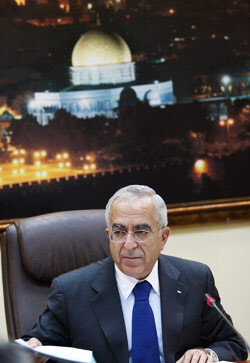The Electronic Intifada 24 November 2009

Salam Fayyad (MaanImages)
Fayyad himself has distanced his own plan from the “threat” that has made the most headlines, following statements by senior members of the Palestine Liberation Organization (PLO) and the PA.
It is this alleged proposal for the Palestinian leadership to declare a state in the West Bank and Gaza Strip that is causing a stir. Palestinian negotiator Saeb Erekat has pointed out that what is being put forward is not simply a unilateral declaration of statehood, but rather an idea of going to the UN Security Council for recognition of a state in the occupied territories.
The suggestion of any unilateral Palestinian steps has been greeted with scorn and angry dismissals by Israeli officials. Prime Minister Benjamin Netanyahu himself issued a warning that there would be “unilateral steps from Israel’s side” (somewhat meaningless, of course, given the daily unilateralism of Israel’s occupation, home demolitions and settlement expansion). Other ministers talked about halting the release to the PA of Palestinian tax money collected via Israel, throwing up more checkpoints in the West Bank and annexing settlement blocs.
The plan has also been criticized by Hamas, US senators and the EU, with the latter describing such a move for independence as “premature.” Negative noises do not seem to have fazed PA President Mahmoud Abbas and Erekat, however even though, given this opposition, it is hard to see how it could be any more effective than the PLO’s previous, symbolic declaration of statehood in 1988.
Yet declaring statehood is only one possible “unilateral” step that has been mentioned of late. Another, related, step that has been discussed is getting rid of the PA altogether. This has been mooted by some Palestinians for a while now (with varying degrees of sincerity), affirming this assessment by political scientist Nathan Brown that the PA is “neither Palestinian nor an authority,” but rather “an internationally-sponsored and partly internationally-financed protectorate administering some Palestinian towns and cities.”
Now, the prospect of the PA’s collapse has been raised in relation to an apparent peace process fatigue amongst the Palestinian leadership. Like the proposed unilateral declaration of statehood, this is seen by many as a tactic by Abbas and his group, designed to push the US administration into applying pressure on Israel. Despite the denials by the likes of Erekat that anyone has really called for dissolving the PA, there has been enough for some commentators like the Adelson Institute’s Dror Bar-Yosef to look ahead and imagine the potential consequences, namely “a new intifada and call for a one-state solution” (“The groundwork for a third intifada is already laid,” The Jerusalem Post, 15 November 2009).
The idea to abandon altogether the two-state framework in favor of some form of binational/one-state formula has also gained more column inches, as a few Palestinian “insiders” raise it as a possibility. Saeb Erekat, for example, told reporters in early November that “other options” including a “one-state solution” should be considered, given the impossibility of creating a Palestinian state in the occupied territories.
The discussion of the one-state solution has entered the mainstream discourse by commentators and journalists partly as a reflection of the way in which it is now invoked by a variety of officials. Israeli Defense Minister Ehud Barak, for example, spoke of how without a peace deal, there will be “a gradual rise in the demand for a bi-national state,” a “threat” he believes should be not underestimated (“Fatah considers reverting to popular warfare,” Ynet, 7 November 2009). Yet the current PA/PLO leaders, wedded to the two-state solution and largely dependent for their positions on the support of international sponsors of the peace process, are as unlikely to embrace such a sea-change as they are to adopt a return to resistance.
While the focus is on Palestinian strategies regarding the peace process, there are other important “unilateral” developments taking place; The Washington Post reported on 21 November that the PLO seeks to keep Abbas in power with the possibility of the transference of the authority of the Palestinian Legislative Council to the PLO’s own Central Council. This is the current kind of “unilateralism” favored by too many Palestinian leaders: a move that is a transparently partisan, undemocratic tactic resulting from the desire to keep the same elite in control and sideline Hamas, carried out under the pretext of avoiding a so-called “constitutional crisis.”
Israeli unilateralism has always focused on creating “facts on the ground”: the settlements, land expropriation, the West Bank wall, colonizing East Jerusalem. There are many counter, unilateral Palestinian strategies with merit: rethinking the negotiations-resistance dynamic, harnessing the creative energies of popular resistance on the ground, following through on important victories like the International Court of Justice advisory opinion calling for dismantling the wall, expanding and embracing the international boycott, divestment and sanctions (BDS) movement, and conducting an organized dissolution of the PA with root and branch reform of the PLO.
But the Palestinian “unilateralism” making recent news is more like a game of politicking — and a dangerous one at that. Abbas could be keen to push the proposal for unilateral statehood/Security Council recognition as a way of undermining Fayyad’s own “two year plan,” amid worries that the US has already designated Fayyad to replace Abbas, just as Abbas himself was “empowered” by the US to sideline and eventually embrace the late Palestinian leader Yasser Arafat. Certainly, Abbas is more preoccupied with addressing the US than his own people. This is indeed a time of transition; but the proposed unilateralism of the PA and PLO leadership is more like the desperate throw of a dice from a regime on its way out, rather than the first steps of a bold, new path.
Ben White is a freelance journalist and writer whose articles have appeared in the Guardian’s “Comment is free,” The Electronic Intifada, the New Statesman, and many others. He is the author of Israeli Apartheid: A Beginner’s Guide (Pluto Press). He can be contacted at ben A T benwhite D O T org D O T uk.





